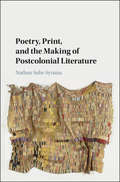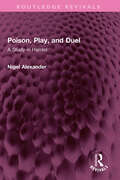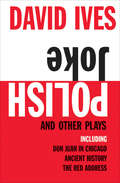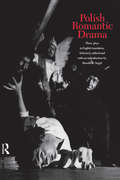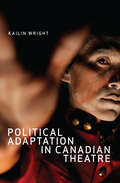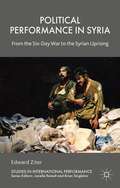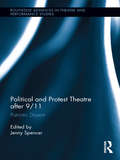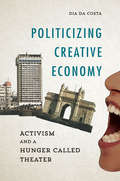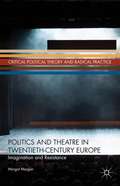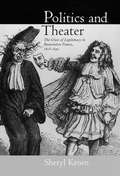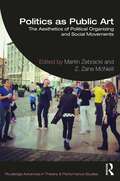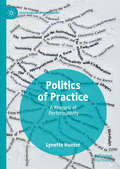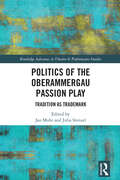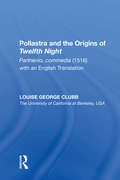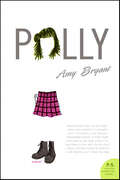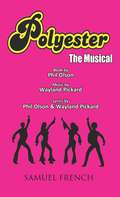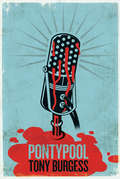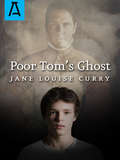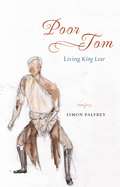- Table View
- List View
Poetry, Print, and the Making of Postcolonial Literature
by Nathan Suhr-SytsmaPoetry, Print, and the Making of Postcolonial Literature reveals an intriguing history of relationships among poets and editors from Ireland and Nigeria, as well as Britain and the Caribbean, during the mid-twentieth-century era of decolonization. The book explores what such leading anglophone poets as Seamus Heaney, Christopher Okigbo, and Derek Walcott had in common: 'peripheral' origins and a desire to address transnational publics without expatriating themselves. The book reconstructs how they gained the imprimatur of both local and London-based cultural institutions. It shows, furthermore, how political crises challenged them to reconsider their poetry's publics. Making substantial use of unpublished archival material, Nathan Suhr-Sytsma examines poems in print, often the pages on which they first appeared, in order to chart the transformation of the anglophone literary world. He argues that these poets' achievements cannot be extricated from the transnational networks through which their poems circulated - and which they in turn remade.
Pointing the Way
by Martin Buber Maurice S. Friedman"These essays, written between 1909 and 1954 and first published as a collection in 1957, in which the eminent philosopher relates the 'I-Thou' dialogue to such varied fields as religion, social thought, philosophy, myth, drama, literature and art, reveal Buber in the process of responding to the crises and challenges of the 20th century and enable the reader to follow his lifelong struggles toward 'authentic existence.'" -Back Cover
Poison, Play, and Duel: A Study in Hamlet (Routledge Revivals)
by Nigel AlexanderFirst published in 1971, Poison, Play and Duel explores the dominant symbols of the language and action of Hamlet. The Ghost first reveals that Claudius murdered his brother by poison, and this act of poisoning is then dramatically presented before the King. The ultimate consequence of the ‘poison in jest’ performed by the actors is the poisoned ‘play’ with rapiers between Laertes and Hamlet. This representation of violence, and the vengeful response to violence, creates the moral and the psychological problems of Hamlet. Critics naturally question, and disagree about, the way that Hamlet plays his role in this play because the role of Hamlet is a theatrical device designed to bring all human actions into debate and question. It is hardly surprising that audiences have seen mirrored in Hamlet their own most fundamental and inescapable problems. Nigel Alexander shows how Shakespeare, like Raphael, Titian and other Renaissance artists, developed and adapted the imagery inherited from the Christian and classical past. The battle within the soul, the choice of life, the hunt of passion, the triple face of prudence and the dance of the graces are given dramatic habitation in Hamlet’s soliloquies, in the inner-play and in the savage contrast of sexuality between Gertrude and Ophelia. This book will be of interest to students of literature, drama, psychology and philosophy.
Polish Joke: And Other Plays (Books That Changed the World)
by David IvesA collection of four works from the American playwright known as &“wizardly . . . magical and funny . . . a master of language&” (The New York Times). This collection brings together four full-length plays from the same dazzling pen that produced the one-act comic masterpieces of All in the Timing. Polish Joke is about a young Polish-American&’s trip through ethnic stereotypes. Nine-year-old Midwesterner Jan Bogdan Sadlowski, nicknamed Jasiu, is told by his uncle that Poles are thought to be &“backward, stupid, inept, and gloomy.&” The only way out is for Jasiu &“to impersonate someone not Polish.&” In Don Juan in Chicago, a Renaissance innocent makes a deal with the devil, only to become a reluctant Latin lover. Ancient History is a comedy-drama about the holy war that breaks out when two people from two very different cultures fall in love. The Red Address paints a searing portrait of a man with a secret who is forced by tragedy into self-revelation. Praise for David Ives &“A pitcher with a great many tricks up his sleeve. He throws like an all-star . . . mixing comedic moods and styles with a dizzying assortment of changeups.&” —The New York Times Polish Joke &“Ives skillfully climbs the slippery slope of political incorrectness without a single mean-spirited stumble.&” —CurtainUp Don Juan in Chicago &“Ives invents an irresistible premise and has fun making good on its promise.&” —Los Angeles Times Ancient History &“A riveting theatrical experience.&” —Show Business The Red Address &“Mix Glengarry Glen Ross with Glen or Glenda . . . A tough-talking drama that mixes business sharks, blackmail, cross-dressing and murder.&” —Variety
Polish Romantic Drama: Three Plays in English Translation (Polish Theatre Archives Ser. #Vol. 5)
by Harold B. SegelThis is the first volume in English to be devoted entirely to Polish Romantic drama. It contains translations of three major plays: Forefathers; Eve, Part III, by Adam Mickiewics; The Un-Divine Comedy by Zygmunt Krasinski; and Fantazy by Juliusz Slowacki. In his highly informative introduction, Professor Segel discusses the plays against the background of the Romantic movement in Poland and points out their ideological and artistic importance. As products of a revolutionary Poland; they were written and published in Paris by writers who either resettled there after the Insurrection of 1830 or otherwise identified with the Great Emigration; they are permeated with the spirit of Romantic Rebellion, with pleas for universial justice, and with queries concerning the role of the poet in society. Brillant productions of the plays in Poland in the late nineteenth and early twentieth-centuries gave impetus to an entire tradition of modern Polish theatrical experimentation as well as dramatic writing which extends to the present day.
Political Adaptation in Canadian Theatre
by Kailin WrightIn Canada, adaptation is a national mode of survival, but it is also a way to create radical change. Throughout history, Canadians have been inheritors and adaptors: of political systems, stories, and customs from the old world and the new. More than updating popular narratives, adaptation informs understandings of culture, race, gender, and sexuality, as well as individual experiences. In Political Adaptation in Canadian Theatre Kailin Wright investigates adaptations that retell popular stories with a political purpose and examines how they acknowledge diverse realities and transform our past. Political Adaptation in Canadian Theatre explores adaptations of Canadian history, Shakespeare, Greek mythologies, and Indigenous history by playwrights who identify as English-Canadian, African-Canadian, French-Canadian, French, Kuna Rappahannock, and Delaware from the Six Nations. Along with new considerations of the activist potential of popular Canadian theatre, this book outlines eight strategies that adaptors employ to challenge conceptions of what it means to be Indigenous, Black, queer, or female. Recent cancellations of theatre productions whose creators borrowed elements from minority cultures demonstrate the need for a distinction between political adaptation and cultural appropriation. Wright builds on Linda Hutcheon's definition of adaptation as repetition with difference and applies identification theory to illustrate how political adaptation at once underlines and undermines its canonical source. An exciting intervention in adaptation studies, Political Adaptation in Canadian Theatre unsettles the dynamics of popular and political theatre and rethinks the ways performance can contribute to how one country defines itself.
Political Cyberformance: The Etheatre Project
by Christina PapagiannouliWritten from a practice-based perspective, this book focuses on the political character of 'cyberformance': the genre of digital performance that uses the Internet as a performance space. The Etheatre Project comprises a series of experimental cyberformances aiming to reconsider the characteristics of theatre in the Internet age.
Political Performance in Syria
by Edward ZiterPolitical Performance in Syria, charts the history of a theatre that has sought the expansion of civil society and imagined alternate political realities. In doing so, the manuscript situates the current use of performance and theatre by artists of the Syrian Revolution within a long history of political contestation.
Political and Protest Theatre after 9/11: Patriotic Dissent (Routledge Advances in Theatre & Performance Studies)
by Jenny SpencerThis collection documents and examines political and protest theatre produced between the 9/11 attacks in 2001 and Obama’s election in 2008 by British and American artists responding to their own governments’ actions and policies during this time. The plays take up topics such as the ongoing wars on terror, Blair’s support of U.S. policies, the flawed intelligence that led to the Iraq war, and illegal detentions and torture at Abu Ghraib. The authors argue that engaged artists faced a radically different sociopolitical context for their work after 9/11 compared to earlier social protest movements and new forms of theatre, and different emotional strategies were necessary to meet the challenges. The subtitle Patriotic Dissent suggests the double stance of many artists-- influenced by patriotic expressions of national solidarity, yet critical of the ways that patriotic language was put to use against others. The articles represent a broad range of theatre: Broadway musicals, documentary theatre, adaptations of classical theatre, new plays by British playwrights, street performances and installations, and musical concerts. The contributors’ case studies evaluate the effectiveness of important instances of political theatre and protest from this decade, arguing for the significance, relevance, and continuing necessity for evolving forms of political theatre today.
Politicizing Creative Economy: Activism and a Hunger Called Theater
by Dia Da CostaScholars increasingly view the arts, creativity, and the creative economy as engines for regenerating global citizenship, renewing decayed local economies, and nurturing a new type of all-inclusive politics. Dia Da Costa delves into these ideas with a critical ethnography of two activist performance groups in India: the Communist-affiliated Jana Natya Manch, and Bhutan Theatre, a community-based group of the indigenous Chhara people. As Da Costa shows, commodification, heritage, and management discussions inevitably creep into performance. Yet the ability of performance to undermine such subtle invasions make street theater a crucial site for considering what counts as creativity in the cultural politics of creative economy. Da Costa explores the precarious lives, livelihoods, and ideologies at the intersection of heritage projects, planning discourse, and activist performance. By analyzing the creators, performers, and activists involved--individuals at the margins of creative economy as well as society--Da Costa builds a provocative argument. Their creative economy practices may survive, challenge, and even reinforce the economies of death, displacement, and divisiveness used by the urban poor to survive.
Politics And Theatre In Twentieth-century Europe
by Margot MorganThis book explores the connection between politics and theatre by looking at the works and lives of Shaw, Brecht, Sartre, and Ionesco, providing a cultural history detailing the changing role of political theatre in twentieth-century Europe.
Politics and Theater: The Crisis of Legitimacy in Restoration France, 1815-1830
by Sheryl KroenIn this book, Sheryl Kroen views post-revolutionary France in the years of the Restoration. Following the lead of the French men and women who turned to this play in the 1820s to make sense of their world, Kroen exposes the crisis of legitimacy defining the regime in these years and demonstrates how the people of the time made steps toward a democratic resolution to this crisis.
Politics as Public Art: The Aesthetics of Political Organizing and Social Movements (Routledge Advances in Theatre & Performance Studies)
by Martin Zebracki Z. Zane McNeillPolitics as Public Art presents a keystone collection that pursues new frameworks for a critical understanding of the relationship between public art and protest movements through the utilization of socially engaged and choreopolitical approaches. This anthology draws from a unique combination of interdisciplinary scholarship and activism where it integrates geographically rich perspectives from political and grassroots community contexts spanning the United States, Europe, Australia, and Southeastern Africa. The volume questions, and reimagines, not only how public art practice can be integral to politics, including forms of surveillance and control of bodily movement. It also probes into how political participation itself can be construed as a form of public artmaking for radical social change and just worlds. This collection advocates for scholar-activist inquiry into how socially engaged public art practices can pave the way for thinking through—and working toward—championing more inclusive futures and, as such, choreographing greater intersectional justice. This book provides a wide appeal to audiences across humanities and social science scholarship, arts practice, and activism seeking conceptual and empirically informed tools for moving from public art and choreopolitical theory into modes of praxis: critical reflection and action.
Politics of Practice: A Rhetoric of Performativity (Performance Philosophy)
by Lynette HunterThis book discusses affective practices in performance through the study of four contemporary performers – Keith Hennessy, Ilya Noé, Caro Novella, and duskin drum – to suggest a tentative rhetoric of performativity generating political affect and permeating attempts at social justice that are often alterior to discourse. The first part of the book makes a case for the political work done alongside discourse by performers practising with materials that are not-known, in ways that are directly relevant to people carrying out their daily lives. In the second part of the book, four case study chapters circle around figures of irresolvable paradox – hendiadys, enthymeme, anecdote, allegory – that gesture to what is not-known, to study strategies for processes of becoming, knowing and valuing. These figures also shape some elements of these performances that make up a suggested rhetorical stance for performativity.
Politics of the Oberammergau Passion Play: Tradition as Trademark (Routledge Advances in Theatre & Performance Studies)
by Jan Mohr Julia StenzelThis collection provides a comprehensive overview of the Oberammergau Passion play and its history from the 19th century onwards. Specialists in theatre and performance studies, comparative literature, theology, political studies, history, and ethnology initiate an interdisciplinary discussion of how Oberammergau has built a trademark from tradition. A typological and historical outline of this development is followed by detailed analyses of the blending of spaces, temporalities, and cultures, through which Oberammergau as an institution is stabilized while at the same time remaining open to the dynamics of historical change. The authors comprise the formation of a theatrical public sphere, literary imaginations, and layers of authenticity in modern practices of distributed communication that culminate in the notion of tradition as trademark. This collection is analysed from a wide spectrum of cultural historical perspectives, ranging from literary studies, theatre and performance studies to theology, political studies, and ethnology.
Politisierung des Theaters und Theatralisierung der Politik im Nationalsozialismus: Müthels „Hamlet“-Inszenierung und Riefenstahls „Triumph des Willens“ (Szene & Horizont. Theaterwissenschaftliche Studien #13)
by Silke Christiane KleineVorliegende Arbeit beschäftigt sich mit den Fragen nach der Politisierung der Bühne während des „Dritten Reiches“ und der Nutzbarmachung theatraler Operativität für die politische nationalsozialistische Massenversammlung anhand der Analysen einer massenwirksamen Hamlet-Inszenierung (Lothar Müthel, Berlin 1936) und von Leni Riefenstahls filmischer Dokumentation des „Reichsparteitags der Einheit und Stärke“ 1934 („Triumph des Willens“). Während sich das Medium der Theaterbühne als nicht sonderlich fruchtbar für propagandistische Zwecke erwiesen hatte, ereignete sich das „eigentliche“ Theater des „Dritten Reiches“ auf den Plätzen und in den Arenen des politischen Massenauftritts. Es geschah also ein Transfer theatraler Mittel und Operativität hin zu öffentlichen Massenveranstaltungen des Regimes. Theatrale, dramaturgische Elemente der Theaterbühne erwiesen sich in Kombination mit massenpsychologischen Grundmechanismen als besonders tragfähig, sodass man sagen kann, dass es sich bei NS-tendenziösen Theaterinszenierungen um Präfigurationen des politischen Massenauftritts handelte. Dies wird anhand öffentlicher Veranstaltungen im Nationalsozialismus erörtert; diese werden im Hinblick auf theatrale Kategorien wie der Ausgestaltung/Architektur des Raumes, Auditivität (Stimme und Rede, die Rolle der Lautsprechertechnologie), Licht/Beleuchtung und Requisiten analysiert. Neben diesen Aspekten der Theaterregie kamen (hier: pseudo-) religiöse Aspekte der Kirchenregie zum Tragen. Leni Riefenstahls filmische Dokumentation „Triumph des Willens“ zeigt eindrücklich die Kulmination der bis dato in vielen Auftritten erprobten massenpsychologischen Dramaturgie im Großereignis von Nürnberg. Zudem entgrenzt Riefenstahl das Ereignis durch die Reproduzierbarkeit des Mediums „Film“. Einerseits stellt der Film den Initiationsprozess für die jungen Nationalsozialisten auf dem „Reichsparteitag“ in Nürnberg dar, andererseits war die „Lektüre“ des Films gleichsam ein Initiationsprozess für den Zuschauer; das filmische Zeugnis Leni Riefenstahls konnte so die Präsenzteilnahme am „Reichsparteitag der Einheit und Stärke“ ersetzen.
Pollastra and the Origins of Twelfth Night: Parthenio, commedia (1516) with an English Translation (Anglo-Italian Renaissance Studies)
by Louise George ClubbPollastra and the Origins of Twelfth Night addresses two closely linked and increasingly studied issues: the nature of the relation of Shakespeare's plays to Italian culture, and the technology of modern theater invented in Renaissance Italy. The discovery of forgotten works by Giovanni Lappoli, known as Pollastra, led to publication in Italy in 1993 in a limited edition of the Italian texts with supplemental scholarship by the authors, entitled Romance and Aretine Humanism in Sienese Comedy. One of those texts, the comedy Parthenio, has escaped the attention of theater bibliographers, because it was quickly sold out in its time and only a handful of copies are known to exist today. Yet it played an important part in the birth of Italian Renaissance drama and of modern comedy in general, in that it was the immediate predecessor and source of Gl'Ingannati, arguably the most famous comedy of the Italian Renaissance and certainly the most imitated, translated, adapted all over Europe. The best known of its progeny is Shakespeare's Twelfth Night. Much has been written in Italy and England about Gl'Ingannati and Shakespeare's debt to it, but nothing at all about Parthenio. This volume provides the first English translation (with the original Italian on facing pages); and presents for an international audience the theatrical scholarship from the 1993 book Romance and Aretine Humanism in Sienese Comedy, augmented with new findings.
Pollution and Crisis in Greek Tragedy
by Fabian MeinelPollution is ubiquitous in Greek tragedy: matricidal Orestes seeks purification at Apollo's shrine in Delphi; carrion from Polyneices' unburied corpse fills the altars of Thebes; delirious Phaedra suffers from a 'pollution of the mind'. This book undertakes the first detailed analysis of the important role which pollution and its counterparts - purity and purification - play in tragedy. It argues that pollution is central in the negotiation of tragic crises, fulfilling a diverse array of functions by virtue of its qualities and associations, from making sense of adversity to configuring civic identity in the encounter of self and other. While primarily a literary study providing close readings of several key plays, the book also provides important new perspectives on pollution. It will appeal to a broad range of scholars and students not only in classics and literary studies, but also in the study of religions and anthropology.
Polly: A Novel
by Amy BryantIf you're looking for Polly Clark, she'll be the girl wearing Doc Martens and a Bad Brains T-shirt at the punk show. She'll be (almost) losing her virginity to a high school dropout, accompanied by the Beastie Boys' "No Sleep Till Brooklyn." She'll be looking for her artistic soul while trying to solve the mysteries of guys, life, her seriously dysfunctional family . . . and herself.In eight chapters, Polly is shaped by eight relationships in this honest, tender, original, and utterly endearing story of one girl's stumbles and successes in the world of punked-out 1980s suburban romance -- the unforgettable debut of an extraordinary new voice in contemporary fiction.
Polyester the Musical
by Phil OlsonMusical Comedy / Characters: 3m, 2f The story of The Synchronistics, an over-the-hill ABBA wannabe group that reunites after 20 years to perform at a public access TV telethon, put their differences aside, and try to save the station from going under. The year was 1979 and The Synchronistics were big. Big enough to be on Johnny Carson. Their hit single, "Better Together" rose to number two on the Billboard Charts. Then something terrible happened that drove the group apart. And now, 20 years later, they're back together in Maple Valley, their home town, to perform at the 1999 WKLN public access TV Telethon. Will they overcome their differences from 20 years ago, act professionally and help save WKLN from going under? Probably not. But you never know what to expect when this dysfunctional group gets together...one last time. It's "Mamma Mia" meets "Spinal Tap" Featuring 16 original songs including "The Funk Train" and "Bump Your Booty Rump." "Be sure to check out this toe-tapping, hilarious journey back to your "Dancing Queen" days!...This show will take you back to the 70's, and you'll hardly be able to control your urge to get up on stage and do "The Funk Train!" - Actors Entertainment "Audience members laughed uncontrollably throughout!...Energetically entertaining!...A rollicking good time!" - The Tolucan Times"I loved it!" - Fred Willard "It's great fun!"- BroadwayWorld.com "A fun and entertaining evening with the audience moving and grooving to the sounds of the 70's style original music and contagious dancing in their seats. It's fun, fun, fun all the way through!...You will have a ball! It's the perfect show to pick up your spirits!"- NoHoArtsDistrict.com
Polyeucte
by Pierre CorneilleThis is a reproduction of a book published before 1923. This book may have occasional imperfections such as missing or blurred pages, poor pictures, errant marks, etc. that were either part of the original artifact, or were introduced by the scanning process. We believe this work is culturally important, and despite the imperfections, have elected to bring it back into print as part of our continuing commitment to the preservation of printed works worldwide. We appreciate your understanding of the imperfections in the preservation process, and hope you enjoy this valuable book.
Ponteach, or the Savages of America
by Tiffany PotterPontiac, or Ponteach, was a Native American leader who made war upon the British in what became known as Pontiac's Rebellion (1763 to 1766). One of the earliest accounts of Pontiac is a play, written in 1766 by the famous frontier soldier Robert Rogers, of the Rangers. Ponteach, or the Savages of America is one of the only early dramatic works composed by an author with personal knowledge of the Indigenous nations of North America. Important both as a literary work and as a historical document, Ponteach interrogates eighteenth-century Europe's widespread ideological constructions of Indigenous peoples as either innocent and noble savages, or monstrous and violent Others.Presented for the first time in a fully annotated edition, Ponteach takes on questions of nationalism, religion, race, cultural identity, gender, and sexuality; the play offers a unique perspective on the Rebellion and on the emergence of Canadian and American identities. Tiffany Potter's edition is supplemented by an introduction that critically and contextually frames the play, as well as by important appendices, including Rogers' ethnographic accounts of the Great Lakes nations.
Pontypool
by Tony BurgessIn the sleepy town of Pontypool, Ontario, no one is safe from an epidemic so devastating it will leave you literally speechless.
Poor Tom's Ghost
by Jane Louise CurryPoor Tom's Ghost--dramatic, wholly convincing, a fascinating intermingling of the centuries--portrays a family whose uncertain bonds are tested and strengthened by a threat from the past.When the Nicholas family first sees the derelict old house near London that has been left to them in Aunt Deb's will, they are sadly disappointed. Thirteen-year-old Roger is the most disappointed, since, having moved place to place all his life with his gifted actor-father, he longs for some measure of stability. Then Roger and his father discover, under peeling wallpaper and rotted paneling, traces of a much older, more graceful house, and their misgivings disappear--until, one night, the house is filled with a sound of wild grieving that Roger traces to an empty room. Only Roger--and later his small stepsister Pippa--sees the ghosts, among them is that of Tom Garland, a well-known actor in Shakespeare's time. But Roger's father, playing Hamlet in the famous National Theatre, is caught up, unknowingly, in Tom's old tragedy. It is a frightened Roger who has to risk his life to find a way to mend the past before the present becomes its tragic echo.
Poor Tom: Living King Lear
by Simon PalfreyKing Lear is perhaps the most fierce and moving play ever written. And yet there is a curious puzzle at its center. The figure to whom Shakespeare gives more lines than anyone except the king—Edgar—has often seemed little more than a blank, ignored and unloved, a belated moralizer who, try as he may, can never truly speak to the play’s savaged heart. He saves his blinded father from suicide, but even this act of care is shadowed by suspicions of evasiveness and bad faith. In Poor Tom, Simon Palfrey asks us to go beyond any such received understandings—and thus to experience King Lear as never before. He argues that the part of Edgar is Shakespeare’s most radical experiment in characterization, and his most exhaustive model of both human and theatrical possibility. The key to the Edgar character is that he spends most of the play disguised, much of it as “Poor Tom of Bedlam,” and his disguises come to uncanny life. The Edgar role is always more than one person; it animates multitudes, past and present and future, and gives life to states of being beyond the normal reach of the senses—undead, or not-yet, or ghostly, or possible rather than actual. And because the Edgar role both connects and retunes all of the figures and scenes in King Lear, close attention to this particular part can shine stunning new light on how the whole play works. The ultimate message of Palfrey’s bravura analysis is the same for readers or actors or audiences as it is for the characters in the play: see and listen feelingly; pay attention, especially when it seems as though there is nothing there.
